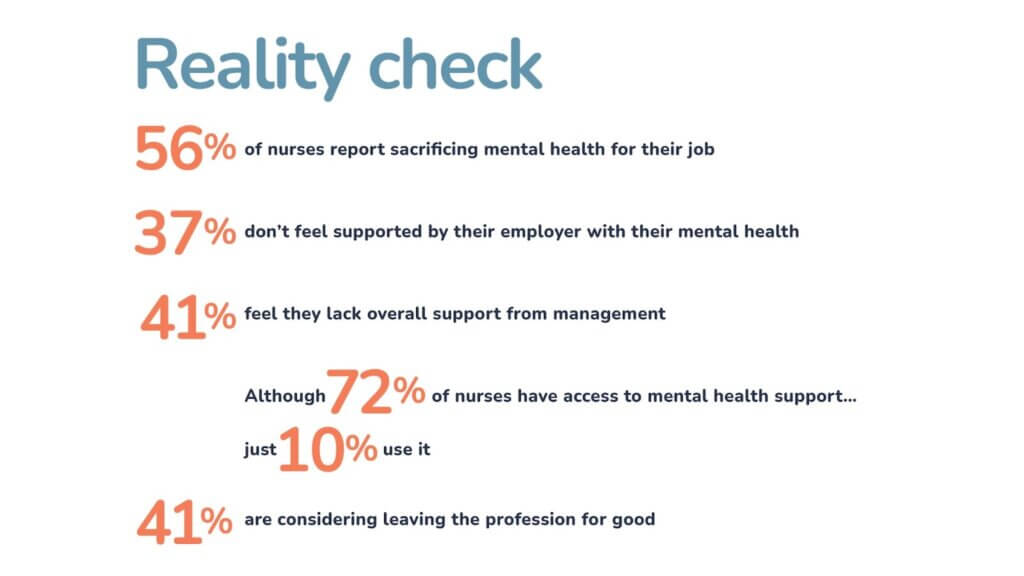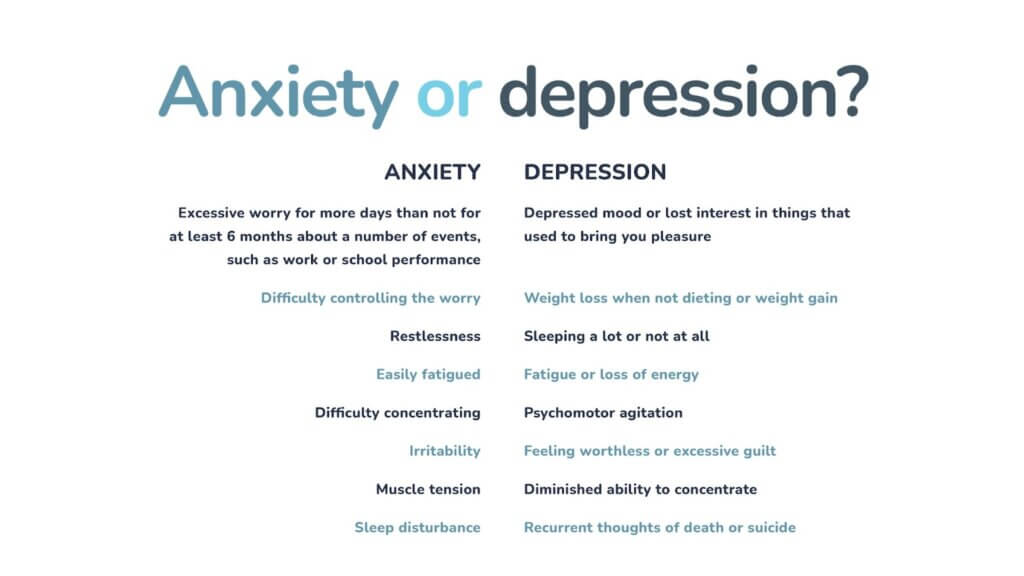May is the awareness month for both Nurses and Mental Health. Let’s explore how these two campaigns can be celebrated together to bring awareness to the mental health of nurses.
Warning: The following article mentions topics that may be intense for certain readers, such as suicide and mental illness. Further, the information on this website is not meant to constitute or replace medical, mental health or counseling services. If you or someone you know is thinking about suicide please call the National Suicide Prevention hotline at 800-273-8255.
Happy Nurses Month! That’s the inspirational opening line I imagined starting this blog with. Yet, it seems empty in light of what nurses have been going through the last couple years. May is also the launch of Mental Health Awareness month, which as I reflect; don’t think is a coincidence. In fact, it may be a fortunate advantage that helps raise the awareness for both causes simultaneously.
As one of the nurses on my team, I was asked to write this kick-off blog to our month-long celebration of clinicians. As I looked for inspiration to frame this article, I came across one of my favorite nursing newsletters from Florence Health. The subject line reminded me to “get vitamin D,” but the opening letter from the CEO stated that the nursing community was mourning a recent loss. A nurse at Kaiser’s Santa Clara Medical Center had committed suicide. She brought a gun to work, and she took her own life in the middle of her shift. I am a self-described positive person; a glass half-full type. But even the most positive person can’t read that and not be horrified.
Reality Check
I didn’t know this nurse, but I feel like I do. While she was completely different from me and had her own story, I assume she entered the profession like most nurses because she wanted to help people. Most of us see nursing as a vocation, a calling, and a cause. So how does something so rooted in care go so wrong? Perhaps it’s because we aren’t caring for ourselves enough? As nurses, maybe we neglect our own mental wellbeing in our quest to help our patients and give to others?
I recognize my observations are anecdotal. I am making conjectures, but I have talked with enough nurses to know what typically drives nurses into the profession. Despite the vast diversity of experience in our profession, we have a lot of similarities. No one started nursing school with the thought, “I’m going to graduate and study for the boards and pass. Then I will give of myself until I have nothing left to give, and then one day, when I’ve reached my limit, I will go to work and take my own life.” Again, I don’t know this nurse and her story but, “Happy Nurses Month?” After reading about her death, those words don’t seem like enough.
What if we use this May to not only thank nurses and raise awareness for mental health, but to also reflect on meaningful changes. Instead of glazing over the actual problems in nursing with a month of discounts and pizza parties, what if we explored mental wellness resources? Or in nurse-speak, what if we treated the actual problem-instead of putting a band-aid on a festering wound that’s caused a systemic infection?
Let’s not only combine Nurses Month with Mental Health Awareness Month – let’s see the overlap of the two as fortuitous, timely and critical. The American Nurses Association (ANA) chose the theme for Nurses Month to be “Nurses Make a Difference,” and the National Alliance on Mental Health (NAMI) chose “TOGETHER for Mental Health.”
Nurses, maybe we take a different approach this year … because nurses make a difference, let’s stand together for our mental health!
Nurses & Mental Health

Historically, nursing is a stoic profession, yet attrition rates demonstrate that if we continue down the current path, we will lose even more of our already burdened workforce. Nurses are taught early in our studies and careers that we sacrifice. We are “signing up” to miss holidays, and important family events, to instead care for with strangers, often in the lowest moments of their lives. So it’s not surprising that many nurses report they are sacrificing their own mental health for their job. Theydon’t feel supported by their employer for mental health, and as a result, are considering leaving the profession. Another study from ANA showed that while nurses reported feeling high levels of exhaustion and other adverse mental health effects, 76% stated they have not sought mental health support because they thought they didn’t need it or should be able to manage stress and mental health wellbeing on their own. I say, enough! Let’s use this month to kickoff a whole new approach that includes active and ongoing investment into real resources that support mental wellbeing.
A New Approach
Starting this month, while we are celebrating our profession, let’s think about how we can make lasting changes in healthcare for the overall workforce. Starting with our own mental health. Let’s no longer accept the status quo for ourselves or those who care for our nation the most. We can all do two things to start making a lasting positive change for our workforce.
#1 Destigmatize Mental Health
Break the stigma associated with mental health, especially in healthcare. Millions of Americans live with mental health issues. To expect that nurses and other healthcare workers are immune is short-sighted. In fact, research from the Mayo Clinic found that nurses think about suicide the most compared to other professions. And even more, nurses who think about suicide are less likely to seek mental health than their peers.
Mental health is equally as important as physical health. Just like we don’t expect nurses and other healthcare workers to be immune to cardiovascular disease or cancer, we can’t assume they don’t suffer from mental illness and fatigue. And just like we wouldn’t expect a nurse to treat their own cardiovascular disease or cancer, we can’t continue to perpetuate the misconception that we can handle our own stress and mental wellness.
Another way to break the stigma associated with mental wellness is to dissect the term “mental illness.” If you’re like me and some of my peers, when you read and hear the label “mental illness,” we think of Jack Nicholson’s portrayal of a psychotic episode in One Flew Over the Cuckoo’s Nest. But this is NOT the typical manifestation of mental illness. The American Psychiatric Association defines mental illness as “health conditions involving changes in emotion, thinking or behavior. . . [and] are associated with distress and/or problems functioning in social, work, or family activities.” Mental illness is a spectrum, and like most things on a range, we pay attention to the extremes; when in fact, most of us exist somewhere in the middle.
#2 Know the Warning Signs
Now that we are more comfortable talking about mental illness and reducing the stigma, how do you know when to get help? The most common mental health illnesses in the United States are depression and anxiety. So it’s essential to know when you should get professional help. Anytime your mental stress starts to interfere with your daily activity, it may be time to reach out. See the tables below with the DSM-IV diagnostic criteria for anxiety and depression.

As a nurse, it is sometimes easier to see mental illness signs and symptoms in others and harder to see them in ourselves. Let’s learn more about when to seek help for yourself, or when your colleague might be in distress.
Gratitude, Above All
So . . . happy Nurses Month!? Absolutely, yes! From the bottom of our hearts, the team at Matchwell wants to say, THANK YOU! We are so very grateful for all you do to care for patients and keep our healthcare system moving. Personally, to my nurse family and all the other healthcare workers out there, I want to express my gratitude that you choose nursing every day.
But at the same time, I would like to make a plea to you. Please stop choosing nursing over yourself. Our profession desperately needs nurses who are well, both physically and mentally. Take the time you need to care for yourself this month and for the rest of your career. As a profession, I hope that we can start changing the course of nursing where we work in a system no longer ignoring our mental health needs.
We can all start by celebrating Nurses Month! Scientific studies have found that a one-time act of thoughtful gratitude produces an immediate 10% increase in happiness and 35% reduction in depressive symptoms. Further, the happy effects of thoughtful gratitude diminish over time, proving that gratitude is an act we should repeat again and again.

